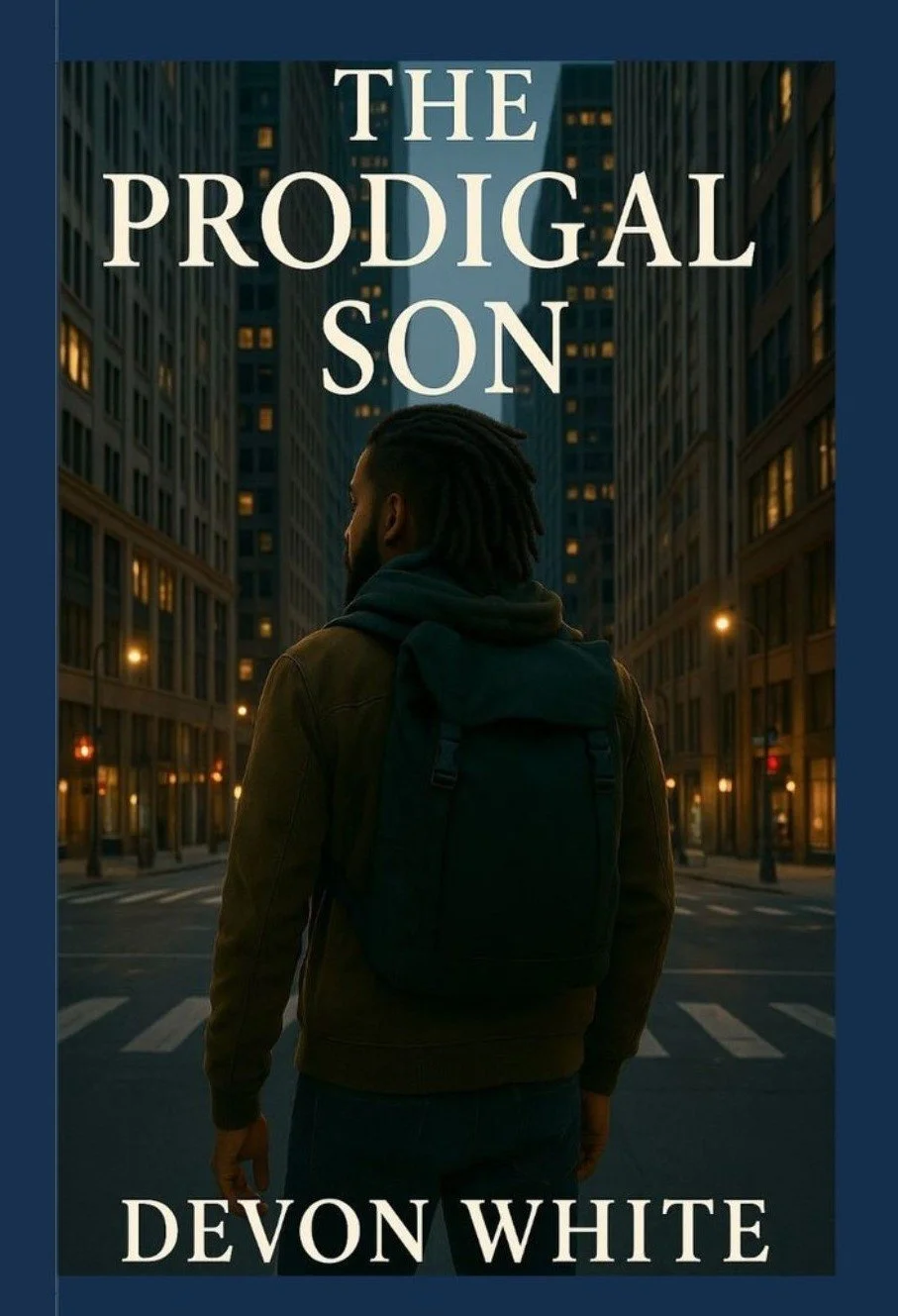
Copyright © 2025 Prosperity Publishing.
All rights reserved, including the right of reproduction in whole or in part in any form.
Edition: First Prosperity Publishing Edition
Purchase copies:
Available online: Amazon
Sneak Preview
*
Sneak Preview *
I Can See Clearly Now
Act 1 – Chapter 1
Title: "The Storm Knows My Name"
The storm had already swallowed most of the sky by the time Charity Woods reached for her coffee. It loomed over the city like a threat disguised as weather; gray, seething, ancient. Outside the penthouse windows, jagged veins of lightning fractured the clouds. Thunder murmured like a prophecy, and the rain came, soft at first, then sharp as needles.
Charity froze.
The ceramic mug trembled slightly in her hands. She hadn’t yet taken a sip. She wouldn’t. Not anymore.
Rain never arrived without demanding something in return.
She set the cup down and exhaled, slow and controlled. The morning had started with her usual routine, yoga at 5:30 a.m., almond protein smoothie, a scan of The New York Times. But that had been before the clouds rolled in, before her body began to hum with that strange, vibrating dread she couldn’t name. Not fear exactly. Not panic either. Something quieter, deeper. An echo.
From somewhere inside, her heartbeat stumbled.
She turned away from the window and stared at the polished marble floor of her Manhattan penthouse, eyes tracking the trembling reflections of raindrops against the glass. She should be packing. Her flight to Atlanta left in three hours, and the Delta Sigma Theta Founders Gala didn’t care about her unresolved grief or unspoken memories. But the storm had rooted her to the floor, one bare foot tucked behind the other, shoulders tense, pulse skipping.
Then came the smell.
Wet wood. Char. Burned paper.
It wasn't real, couldn't be, but the scent was so vivid it wrapped itself around her throat. She closed her eyes, and the air in the room shifted.
Crack!
Thunder rolled across the sky. And just like that, time folded.
She was seven again.
To Be Continued…
Purchase your copy on KDP.Amazon.com
I Can See Clearly Now: White, Mr. DeVon: 9798317675868: Amazon.com: Books
The Harder They Fall
Chapter 1: The Weight of Books
The walk home from school was always the longest part of Taylor Wilson’s day.
Not because the distance was insurmountable, or the sidewalks particularly arduous. Rather, it was the silence that accompanied each step, a quietude that cloaked her in a sense of isolation. Her backpack, a hand-me-down far too large for her frame, seemed to grow heavier with each passing moment, laden with textbooks and notebooks that offered far more comfort than the company of her peers. Her algebra book was bound together with a rubber band, its spine long since surrendered to wear, but Taylor valued it, nonetheless. Numbers were consistent. Words, even more so. They did not turn against you.
The route she traveled was familiar, etched in muscle memory. And yet, every afternoon, it felt foreign, as though her existence along that path was tolerated rather than embraced. She kept her head bowed, eyes cast downward, shoulders tucked in, as if to render herself invisible.
Behind her, laughter sliced through the air.
“Taylor-Timid.”
The nickname, cruel, childish, and undeserved, had taken root. It followed her through the corridors and into the daylight, whispered with amused contempt by those who thrived on hierarchy.
“I imagine she organizes her bookshelf alphabetically and color-coded,” one voice remarked with mock sophistication, followed by a chorus of insincere laughter.
Taylor chose not to respond. Retorts only invited escalation. Her silence was not born of defeat but of careful calculation. It was the quiet dignity of someone who had long since decided that their worth would not be debated by those incapable of understanding it.
By the time she reached the modest home she shared with her mother, the scent of dinner, drifted through the open window. It was the kind of smell that evoked comfort and nostalgia, a symphony that reminded her she was, at the very least, cherished within these walls.
The porch welcomed her with a creak, the screen door screeching slightly as she stepped inside.
“Is that you, Taylor?” her mother’s voice called, warm and reassuring.
“Yes, Mother,” she replied.
“Dinner is nearly ready. How are you?”
Taylor hesitated. She could have explained the events of the day, the laughter, the mockery, the fatigue that weighed heavier than her bag. But she knew her mother’s heart already bore too much.
“I am. Just a bit weary,” she said softly.
Her mother emerged from the kitchen, apron tied neatly around her waist, hands slightly flour-dusted. She took one look at Taylor and said nothing. Instead, she approached and gently cupped her daughter’s face, brushing her cheeks with quiet affection.
“Go freshen up. I’ll prepare your plate.”
Taylor offered a faint smile before ascending the stairs to her room. There, she unzipped her backpack and laid its contents across the bed: textbooks, notepads, and a journal adorned with pressed violets and a satin ribbon.
She opened it to a fresh page.
“Today, I faded into the background once more. The sting lessens with each occurrence. Perhaps I am becoming adept at being unseen, invisible.”
To Be Continued…
Purchase your copy on KDP.Amazon.com
The Harder They Fall: White, Mr. DeVon: 9798285575269: Amazon.com: Books
The Prodigal Son
Chapter 1: The Departure
DeMarco had always believed he knew best. Rules were suggestions. Advice was noise. Even love, when it came with expectations, felt like a leash to him. So, when he stood across from his father one quiet evening and asked for his trust fund, he wasn’t seeking permission. He was making a declaration.
His father didn’t answer right away. The air between them was still, thick with the unspoken. The older man sat in his armchair, elbows resting on his knees, eyes fixed on the carpet. The weight of the request pressed on him, heavier than the years had ever managed to do.
“I’ve done what you asked,” DeMarco said. “School. The business internships. Everything. But I need to find out who I am, on my own. I’m not meant to follow a blueprint someone else drew for me.”
Still, no response. Only the soft ticking of the wall clock and the hum of the refrigerator down the hall.
After a long silence, his father finally lifted his head. His eyes were red-rimmed, tired in a way DeMarco had never seen before. “If I give you this,” he said slowly, “you must remember one thing. If things fall apart out there, if nothing works out, you can always come back home. No shame. No lectures. Just come home.”
DeMarco nodded, but only half-listened. His heart had already left. He heard the part about the trust fund, not the part about returning. The idea of failure didn’t register. In his mind, he was already beyond the walls of this house, past the reach of anyone who thought they knew what was best for him.
That night, he packed lightly. A couple of bags. Some clothes. A notebook. He didn’t even bother with things that had once mattered. Trophies. Photos. Childhood mementos. None of it felt relevant. Tomorrow didn’t feel like a new chapter. It felt like a brand-new book. One, he could finally write himself.
He slipped out before dawn. The house was quiet. The city was still dark and half-asleep. He didn’t leave a note. He didn’t say goodbye. He didn’t think he needed to.
His father, however, had hoped for a miracle. He had gone to bed thinking maybe sleep would soften his son’s resolve. Maybe the morning would bring clarity. Maybe love would win.
At first light, he rushed to DeMarco’s room. His heart beat fast as he climbed the stairs, hope barely holding together his worry. He opened the door, expecting to see his son curled under the covers, maybe irritated but still home. Instead, the room was stripped of life. The drawers were left half-open, the closet nearly bare, the bed unmade. The morning sun cut across the room through a gap in the curtains, spotlighting the emptiness.
He stood frozen. Then he stepped forward, almost in disbelief, and picked up the comforter that had fallen off the bed. He pulled it close to his chest and inhaled deeply. It still smelled like DeMarco. A mix of laundry soap and something boyish he could never quite name. That scent alone broke him.
“He’s gone,” he whispered. “He left. Without a word.”
The grief came in waves. He clutched the comforter like it was his son himself, rocking slightly, eyes glazed and wet. He didn’t even notice Cameron in the doorway until his older son stepped into the room.
“Dad,” Cameron said, his voice low.
Their father didn’t answer. He just kept repeating it. “He left. He’s gone. My son is gone.”
To Be Continued…
Purchase your copy on KDP.Amazon.com
The Prodigal Son: White, Mr. DeVon: 9798288039263: Amazon.com: Books
The Sword – Honoring The Code
Prelude: The Weight of Legacy
The moon hung low over the Tiger Clan estate, a pale lantern in the endless dark. Its silver light spilled across the courtyard, glinting off the edges of ancient swords and polished armor displayed in silent tribute to generations of warriors. Within these walls, honor was not just tradition, it was law. And for Ochiru Hoshi, it was a law he struggled to obey.
Ochiru, son of Lord Tōshin, heir to the Noble Tiger Clan, stood before the sacred pavilion with restless eyes. Tall and striking, his appearance reflected strength and promise, yet a quiet storm brewed beneath the surface. He had been trained in the ways of the samurai since childhood, his every movement measured against centuries of expectation. But even as he bowed to the rituals and spoke the words of duty, his heart sometimes strayed from the rigid path carved for him.
His father often reminded him: “Strength is nothing without restraint. A sword drawn in pride is a sword lost to dishonor.” Lord Tōshin’s voice was calm but carried the weight of the generations who came before him. Ochiru revered his father, but there were moments when those teachings felt like chains rather than guidance.
Tonight, the chains were heavy.
He gazed at the Tiger Fang Pendant resting on the altar, its polished ivory catching the moonlight. It was more than an heirloom; it was the embodiment of his clan’s soul. Soon, that pendant would pass fully to him. It was a symbol of leadership, of judgment, of decisions that could alter the course of families and clans alike.
Ochiru’s chest tightened. He wanted to be worthy of that responsibility, but deep inside, he feared he wasn’t.
To Be Continued…
Purchase your copy on KDP.Amazon.com
The Sword: Honoring The Code: White, Mr. DeVon: 9798267560535: Amazon.com: Books
I hope you enjoyed the Sneak Preview.
Now Go & Enjoy Your Copy!
Company Name: Prosperity Publishing
Mission: "Touching The World One Book At A Time."
Vision: To become a global beacon for transformative, purpose-driven literature that educates, uplifts, and empowers readers.








